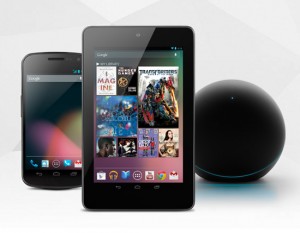Google Grabs Our Attention at I/O 2012
July 2, 2012 Last week, Google made a serious play for the tech industry’s press conference throne with back-to-back presentations at their I/O 2012 developer conference in San Francisco. Read on to find out about their biggest announcements, including not one but two never-before-seen devices.
Last week, Google made a serious play for the tech industry’s press conference throne with back-to-back presentations at their I/O 2012 developer conference in San Francisco. Read on to find out about their biggest announcements, including not one but two never-before-seen devices.
Jelly Bean – The next edition of Google’s mobile operating system, Android 4.1, is almost live. Codenamed Jelly Bean, this version of Android features an enhanced notification system, smoother transitions and animations, and a beefed up voice-recognition system, among other improvements. The update also includes Google Now, a time and location-aware search function. Google Now inhabits a similar personal assistant-like space as Siri does on the iPhone, but hopes to best Apple’s efforts by accumulating data on its user to create a more personalized experience. If there’s one thing Google knows, it’s studying their users’ habits.
Nexus 7 – Much like they’ve done in the mobile phone space, Google have taken it upon themselves to create their own Google-branded tablet as part of their flagship “Nexus” line of products. The Nexus 7 is a 7-inch, $199 touchscreen tablet due to start shipping in 2-3 weeks. Made by hardware manufacturer Asus, the Nexus 7 is aimed specifically at delivering multimedia content from the Google Play marketplace, where users can buy music, videos, books and now magazines. Powered by a Tegra 3 processor and 1GB of Ram, the slick-looking device probably isn’t making Google any money at such a low purchase price, but has a chance to succeed at bringing new users into the Google ecosystem for all their future digital shopping.
Galaxy Q – The most surprising (and confusing) announcement of the week was Google’s new living-room media streamer, the Galaxy Q. While the Q’s spherical, glowing design is almost obnoxiously cool, its functionality is…pretty boring. Plug it into your TV or stereo, and it will access all of your Google Play-purchased media. Instead of your remote, you control the Galaxy Q with a custom Android App on your phone or tablet, and multiple users can access it at the same time to collaborate on playlists. But beyond looking crazy and futuristic, all it really does is pull down various media from the cloud, which a number of devices (Roku, Apple TV, etc.) already do.
Project Glass – Though it had been previously revealed, Google used I/O as another opportunity to demonstrate the possibilities of their wearable computer concept, Project Glass. While Project Glass’s operating system and control scheme were sadly absent from the presentation, Google went through great lengths to show off the unique functionality of the device’s always-on head-mounted camera. How great, you ask? They dropped a half-dozen sky-divers out of a blimp over the convention center and broadcast each of their first person POV camera feeds in a Google+ Hangout video chat. As far as stunts go, it was certainly ambitious; for an asking price of $1,500 per pair of Project Glass glasses, it’s a good thing nobody dropped their headsets mid-dive.
Alexei Bochenek is a lifelong tech nerd & film buff based in Los Angeles. When he’s not playing with his phone, it’s because the movie has started. Shhhhh!





